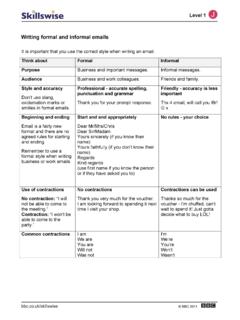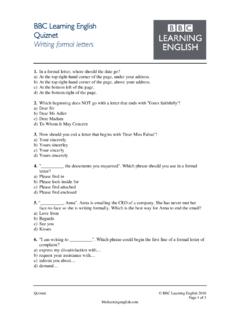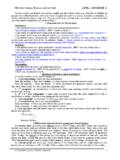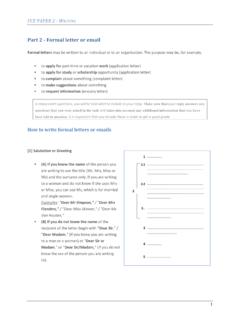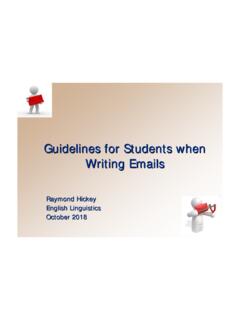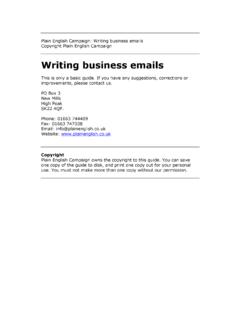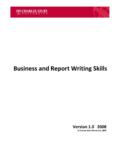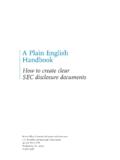Transcription of FCE Paper 2 Writing (from December 2008) - Brays …
1 FCE Writing How to pass the Cambridge First Certificate Writing Section 2 Index: Introduction .. 3 Who is this book for? .. 3 What s in the FCE Writing exam? .. 3 Summary .. 3 Part 1 .. 3 Part 2 .. 4 How is the exam assessed? .. 4 5 essentials for good answers .. 4 Part 1: Writing essays .. 5 Introduction and tips ( Writing essays) .. 5 Useful phrases ( Writing essays) .. 5 Sample questions ( Writing essays) .. 6 Part : Writing formal letters or emails .. 7 Introduction ( Writing formal letters or emails) .. 7 Useful phrases ( Writing formal letters or emails) .. 7 Sample questions ( Writing formal letters and emails).
2 11 Part : Writing informal letters or emails .. 13 Introduction ( Writing informal letters or emails) .. 13 Useful phrases ( Writing informal letters or emails) .. 13 Sample Questions ( Writing Informal Letters and emails) .. 14 Part : Writing articles .. 16 Introduction and tips ( Writing articles) .. 16 Useful phrases ( Writing articles) .. 16 Sample questions ( Writing articles) .. 17 Part : Writing reports .. 18 Introduction and tips ( Writing reports) .. 18 Useful phrases ( Writing reports) .. 19 Sample questions ( Writing reports) .. 19 Part : Writing reviews .. 20 Introduction and tips ( Writing reviews) .. 20 Useful phrases ( Writing reviews) .. 20 Sample questions ( Writing reviews) .. 22 Finally .. 23 3 Introduction Who is this book for?
3 This book is for students who want good marks in the Writing section of the Cambridge Fist Certificate Exam (FCE). It is also useful for any Upper Intermediate student who would like to improve his or her Writing . It is also for teachers. Use it exactly as you like. Forward it to students. Print it out. Use it in class. It s completely up to you. I hope you find it useful. Enjoy your English and every success with exams. Alan Bray Santander, July 2016. You can find other free materials to help you prepare for the B2 First Certificate Exam at the following website, To buy a Complete FCE or FCE for Schools Online Course with 100 150 hours of Listening, Reading, and Use of English practise (including over 50 Exam Practice Papers) click here.
4 Simply practise and take the mock exams until you are sure of exam success. Spanish speakers can access this page. What s in the FCE Writing exam? In the two parts of the Cambridge English: First Writing Paper , you have to show that you can write different types of text in English. Summary Time allowed: 1 hour 20 minutes Number of parts: 2 Number of questions: Part 1: one compulsory question, Part 2: one question from a choice of three Types of task: Articles, email, essay, letter, report, review. Part 1 4 You are given an essay title and two ideas clearly linked to the title. You write an essay giving your opinions about the title, using the ideas given.
5 You must also add a third, different idea of your own linked to the title. The title will be a subject of general interest you won t need any specialised knowledge. What do I have to practise? Using language functions, such as evaluating, expressing opinions, hypothesising, justifying, persuading. How many questions are there? One compulsory question. How much do I have to write? 140 190 words. Part 2 What's in Part 2? You write a text from a choice of text types article, email/letter, report or review. To guide your Writing , you ll be given information about context, topic, purpose and target reader. What do I have to practise? Writing different types of text that could be included in the exam. How many questions are there? One task to be selected from a choice of three.
6 How much do I have to write? 140 190 words How is the exam assessed? Answers are assessed using both a general mark scheme, which is used for all the questions, and a separate task-specific mark scheme for each question. The criteria used to assess the candidates answers in the general mark scheme include: range of structure, vocabulary and expression effectiveness of organisation, including paragraphing and linking devices accuracy of grammar and spelling awareness of the situation and target reader. 5 essentials for good answers 1. Answer the question 2. Plan 3. Use paragraphs 4. Revise your work 5. Make sure you answer the question exactly and no more. It is essential to plan your Writing . This should take at least 10 minutes to plan for each question. 5 In a relatively short piece of Writing you will need 4 or 5 paragraphs.
7 The first paragraph will be your introduction. Paragraphs 2, 3 and perhaps 4, will contain the body of your answer, and the last paragraph your concluding comments. Allow at least 5 minutes for each question to check your answer. Look out for silly mistakes with tenses, word order, spellings etc. Part 1: Writing essays Introduction and tips ( Writing essays) 1. ANSWER THE QUESTION. 2. PLAN your essay. 3. REVISE your essay to correct mistakes. 4. 4 or 5 PARAGRAPHS, with introduction and conclusion. The first paragraph should be a general introduction. In the middle paragraphs develop your arguments. Give reasons to support your argument. Use a variety of discussive words and phrases. Give examples where possible. Use formal language. Don't use contractions (we're, I've etc.)
8 The final paragraph is the best place to express your opinion clearly. Useful phrases ( Writing essays) Presenting two advantages or disadvantages together: not only .. but .. also not only .. but also Presenting two opposing views: on the one hand, on the other hand Expressing Contrast: nevertheless even so even though however in spite of despite but although Expressing results: because of this 6 therefore thus as a result for this reason consequently Giving examples: such as like for example for instance Expressing the opinion of someone else: some people say some people say that many people say many people say that people often say it is said it is said that according to Sample questions ( Writing essays) 1.
9 You have done a project on transport in your English class. Your teacher has asked you to write an essay giving your opinions on the following statement. Because cars are so convenient public transport has no future. Write your essay in 140-190 words in an appropriate style. 2. You have had a discussion on fashion in your English class. Your teacher has asked you to write an essay, giving your opinions on the following statement. Young people never want to dress the same as their parents Write your essay in 140-190 words in an appropriate style. 3. You have had a discussion on the media's treatment of famous people in your English class. Your teacher has asked you to write an essay, giving your opinions on the following statement. Famous people such as footballers, film stars and politicians, deserve to have a private life without journalists constantly following them.
10 7 Write your essay in 140-190 words in an appropriate style. This page from First Certificate Writing gives 5 further titles with sample plans and answers. An excellent page. Part : Writing formal letters or emails Introduction ( Writing formal letters or emails) Writing formal letters is a necessary skill that you need for most ESL or EFL exams at Intermediate Level and above. Examples: You are given an article to read from a newspaper. You write to the newspaper disagreeing with the article. You write to complain about something. You write making suggestions about something. You write requesting information. You write giving information.

